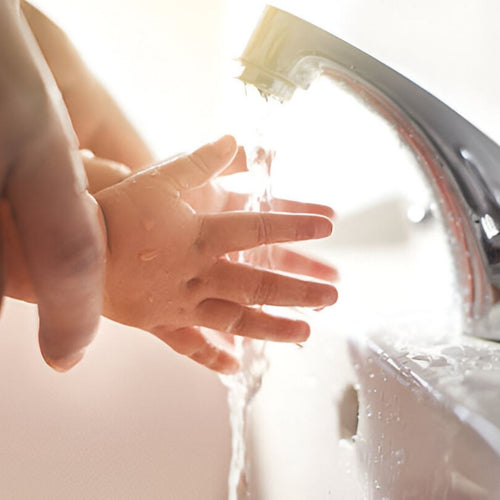Water hardness refers to the amount of dissolved calcium and magnesium minerals present in your water supply. These minerals, while not harmful to consume, can create a host of problems throughout your home.
Why does water hardness matter? Hard water can lead to:
✓ Inefficient appliances: Hard water causes limescale buildup that reduces the lifespan of water heaters, dishwashers, and washing machines.
✓ Cleaning challenges: Soap reacts with hard water minerals, causing soap scum, spotty dishes, and difficulty getting a good lather.
✓ Skin and hair concerns: Hard water can leave skin feeling dry and itchy, and hair looking dull and lifeless.
If you notice mineral deposits on faucets, struggle to get dishes spotless, or experience dry skin after showering, hard water could be the culprit. Hard water is a widespread issue, particularly in areas with groundwater sources that pass through limestone or other mineral-rich formations.
How Does Water Become Hard?
Water, in its purest form, is relatively soft. However, as it travels through the water cycle, it picks up minerals from the environment. The primary culprits behind hard water are calcium and magnesium.
When rainwater seeps through the ground, it becomes slightly acidic. This acidity allows the water to dissolve minerals like calcium carbonate from limestone deposits and magnesium from dolomite formations.
The level of water hardness depends on the geological makeup of a region. Areas with significant limestone or other calcium-rich rock formations tend to have harder water. While calcium and magnesium are the main contributors, other minerals like iron can also contribute to water hardness.
Types of Water Hardness
✓ Temporary Hardness: Caused primarily by calcium carbonate, which precipitates out when water is heated, leaving behind limescale deposits.
✓ Permanent Hardness: Caused by other dissolved minerals that don't precipitate as easily, requiring alternative treatment methods.
Units of Measurement
Water hardness is typically measured in grains per gallon (gpg) or parts per million (ppm). One grain per gallon is equivalent to 17.1 ppm. Water hardness levels can be classified from soft to very hard based on these measurements.
What Problems Does Hard Water Cause?
Hard water's negative impacts extend throughout your home, affecting your appliances, plumbing, cleaning routines, and even your skin and hair.
Appliance Woes
✓ Limescale Buildup: As water evaporates, it leaves behind mineral deposits, particularly inside water heaters, dishwashers, and washing machines.
✓ Reduced Efficiency: Limescale acts as an insulator, forcing appliances to work harder and use more energy to heat water.
✓ Shorter Lifespan: Continuous strain from hard water can lead to premature failure of water-using appliances.
Cleaning Frustrations
✓ Soap Scum & Spotting: Hard water minerals interfere with soap's ability to lather, resulting in a stubborn film on surfaces and spotty, cloudy dishes.
✓ Dull Laundry: Minerals can bind to fabrics, making clothes feel stiff and colors appear less vibrant.
Skin & Hair Concerns
- Dryness & Irritation: Hard water disrupts the skin's natural moisture balance, causing dryness, itchiness, and potentially exacerbating conditions like eczema.
- Dull, Lifeless Hair: Mineral residues can coat hair strands, making it look flat, feel rough, and hindering product effectiveness.
Plumbing Problems
- Clogged Pipes: Over time, limescale buildup can reduce water flow in pipes and increase the risk of clogs.
- Damage to Fixtures: Mineral deposits leave unsightly stains on faucets and showerheads, and can corrode internal parts.
How Do I Know If I Have Hard Water?
There are several ways to determine if hard water is affecting your home – from visual clues to professional testing.
Visual Cues
✓ Spotting on Dishes: Hard water leaves behind white spots or a cloudy film on glassware and dishes, even after thorough washing.
✓ Soap Scum: Look for a stubborn, white residue on shower doors, bathtubs, and sinks that's difficult to remove with regular cleaners.
✓ Mineral Buildup: Notice crusty, white deposits around faucets, showerheads, or inside appliances like your kettle.
At-Home Testing
✓ DIY Test Kits: Many hardware or home improvement stores offer simple hard water test kits. These typically involve adding a few drops of a special solution to a water sample and observing the color change.
Professional Testing
✓ Local Water Utility: Your water provider may offer testing services or provide a water quality report that includes hardness levels.
✓ Certified Labs: For the most accurate analysis, consider sending a water sample to a certified laboratory specializing in water testing.
Geography as a Guide
✓ USGS Water Hardness Map: The United States Geological Survey (USGS) maintains a comprehensive map of water hardness levels across the country. This can give you a general idea of the water hardness likely in your area.
Solutions for Hard Water
Fortunately, there are effective ways to combat hard water and its negative effects. The best solution for you will depend on the severity of your water hardness and your individual needs.
Water Softeners
✓ The Mainstay of Hard Water Treatment: Water softeners are specialized appliances designed to remove hardness minerals through a process called ion exchange.
✓ How They Work: Water softeners contain resin beads that attract and trap calcium and magnesium ions, replacing them with sodium or potassium ions.
Types:
✓ Salt-based softeners: The most common and effective type, using salt to regenerate the resin beads.
✓ Salt-free systems: Also known as water conditioners, these systems alter the structure of hardness minerals to prevent them from forming limescale, but they don't technically remove the minerals.
✓ Choosing a System: Consider factors like your household size, water usage, and the severity of your water hardness when selecting a softener.
SoftPro Water Systems
At SoftPro Water Systems, we offer cutting-edge water softening solutions designed to tackle hard water problems and improve your overall water quality.
Our systems feature advanced technology like upflow regeneration for salt and water efficiency, and demand-based operation to tailor softening to your exact needs.
Other Options (When Softeners Might Not Be Ideal)
✓ Descaling Appliances: Regularly removing limescale buildup from appliances can help mitigate some of hard water's damaging effects.
✓ Specialized Detergents: Formulations designed for hard water can improve cleaning results.
✓ Whole-house Filters: Some filtration systems may reduce hardness minerals alongside other contaminants, but it's important to verify their specific capabilities.
The SoftPro Difference
SoftPro Water Systems is dedicated to providing superior water softening solutions that not only combat hard water but also elevate the quality of life within your home. Here's what sets us apart:
Innovative Technology
✓ Upflow Regeneration: Our systems regenerate the softening resin counter to the flow of water, resulting in greater salt and water efficiency.
✓ Demand-Based Operation: Softeners adjust their cycles based on your actual water usage patterns, optimizing performance and saving resources.
Unmatched Efficiency
✓ Reduced Salt & Water Waste: Our technology minimizes waste, saving you money on operating costs.
✓ Environmental Responsibility: SoftPro systems prioritize eco-consciousness in their design and operation.
Whole-Home Improvement
✓ Softer Skin & Hair: Enjoy softer skin and healthier, more manageable hair after showering.
✓ Spot-Free Dishes & Cleaner Laundry: Experience the joy of sparkling dishes and brighter, softer laundry.
✓ Appliance Protection: Extend the life of your water-using appliances and save on costly repairs.
Personalized Solutions
✓ Expert Analysis: We carefully assess your household needs and water hardness to recommend the perfect SoftPro system for you.
✓ Tailored Systems: Our range of softeners ensures a solution that matches your specific water quality challenges.
Exceptional Customer Support
✓ Dedication from Start to Finish: We're committed to providing outstanding support throughout your water softening journey, from initial consultation to long-term system maintenance.
Reclaim Your Water: Understanding & Addressing Hard Water
Hard water, caused by dissolved minerals like calcium and magnesium, is a common household problem with consequences extending from appliance damage to cleaning frustrations and even personal discomfort.
Identifying the signs of hard water – spotting, soap scum, mineral buildup – is the first step towards finding the right solution for your needs. While options like descaling and specialized detergents can help, water softeners are the most effective way to combat hard water at its source.
Key Takeaways
✓ Hard water reduces the efficiency and lifespan of water-using appliances.
✓ Cleaning with hard water requires more effort and often leads to less-than-ideal results.
✓ Hard water can negatively impact the health and appearance of your skin and hair.
✓ Testing your water hardness level is crucial in determining the best course of action.
✓ Water softeners provide a comprehensive solution for hard water problems, offering a range of benefits for your home.
Experience the Transformation with SoftPro
Don't let hard water compromise your quality of life. If you're ready to experience the transformative difference of soft water, contact SoftPro Water Systems today. Let us help you personalize a solution that banishes hard water worries and revitalizes your home environment.


















![Aldex Premium 10% Cross Link Resin for Water Softener [High Capacity]-SoftPro® Water Systems](http://www.softprowatersystems.com/cdn/shop/files/Aldex_10_Cross_Link_Resin_Premium_High_Capacity_for_Water_Softener_600x.jpg?v=1735853599)























